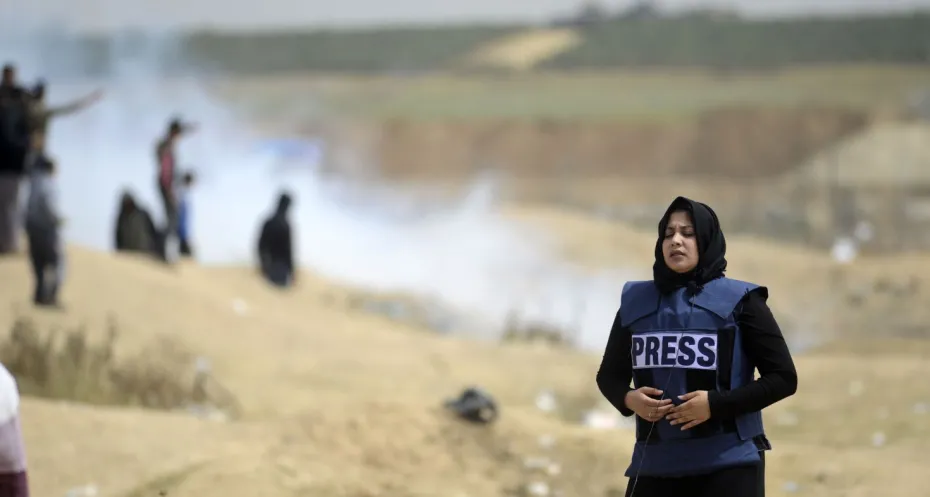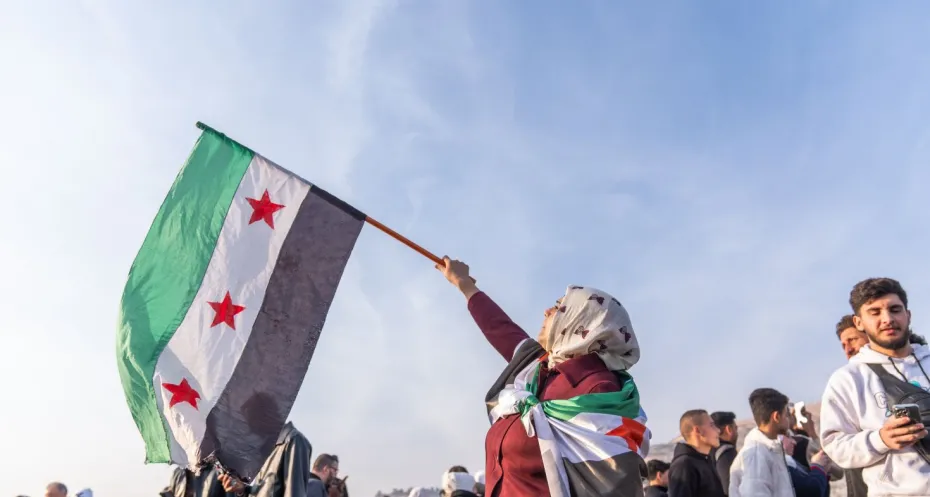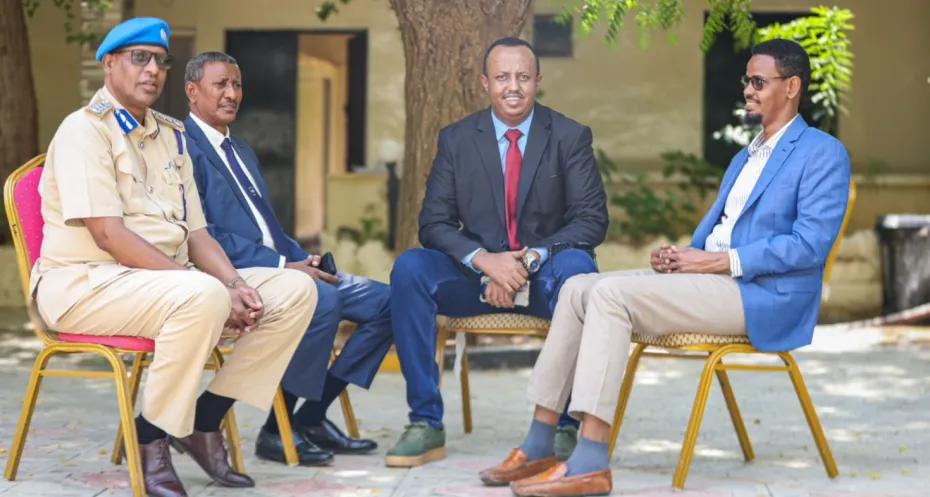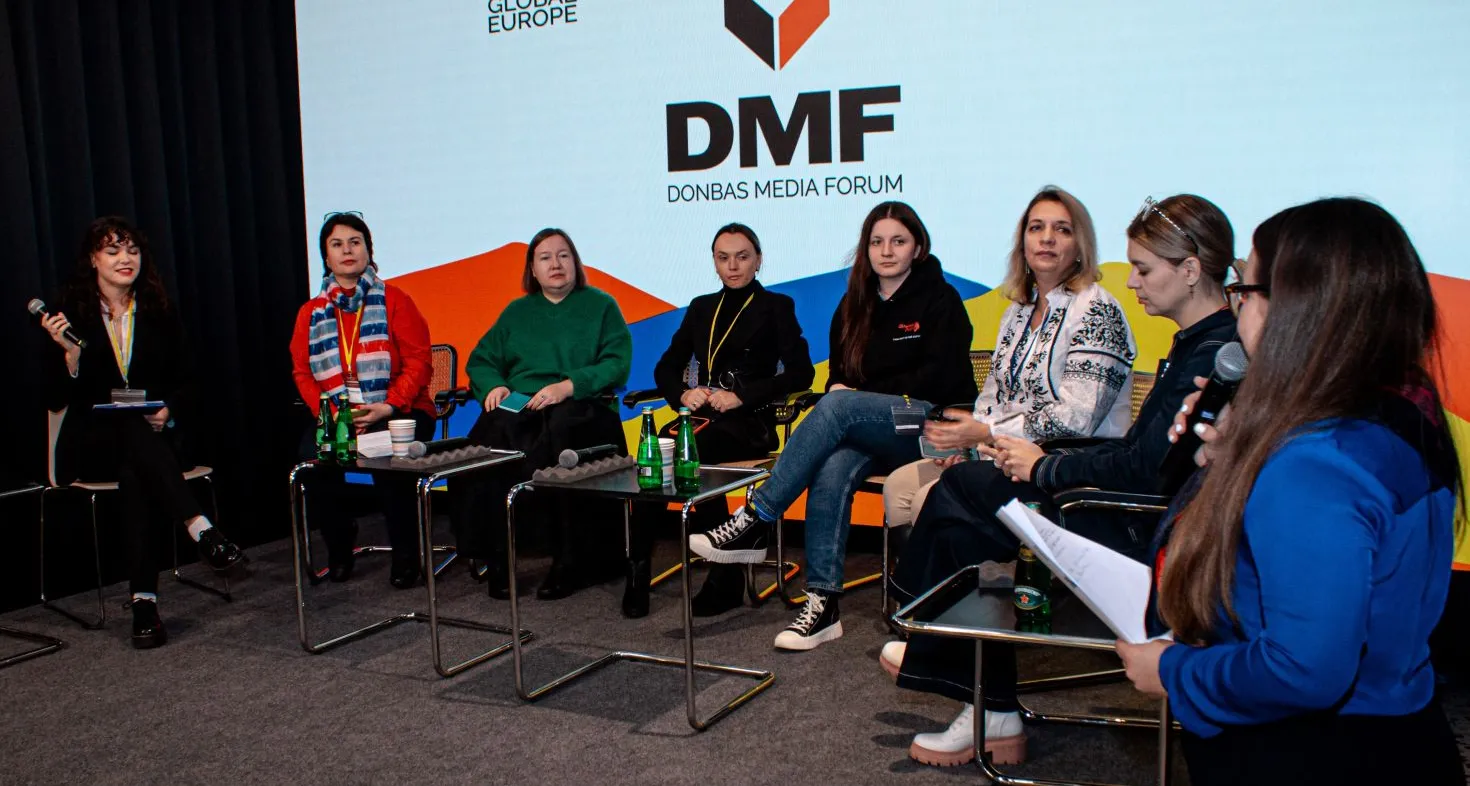
Donbas Media Forum: connecting Ukrainian journalists separated by the war
After the first Russian invasion of Ukraine and occupation of Donbas, Luhansk and Crimea between 2014-2015, several dozen regional newspapers and TV channels ceased to function in the Donetsk and Luhansk provinces, and websites and radio stations were shut down. Armed Russian and pro-Russian militants seized editorial offices and imposed censorship on the occupied territories, which led to complete information isolation of the local people. For media to stay in touch with eachother, the Donbas Media Forum was organised.
The first Donbas Media Forum took place in 2015 in Kyiv. 247 media representatives gathered and a "Propaganda Kiosk" was presented to demonstrate how propaganda works on Russian-language television. Since then Donbas Media Forum is a platform for safe dialogue between journalists separated by the war. This platform allows them to jointly discuss the problems and seek international and domestic support for Donbas media during the years of occupation under ongoing war.
Free Press Unlimited believes in keeping up a strong network and solidarity between different media and therefore gladly supported the organisation of the Donbas Media Forum of 2023.
Media warfare
Russia's full-scale invasion of Ukraine on 24 February 2022 has changed the work of the Ukrainian media. Suddenly they had to work 24/7 to inform citizens about air alerts and possible missile strikes and developments on the frontlines, and information was mainly spread through social networks.
The journey of Ukrainian media, marked by ongoing adaptation to a dynamic environment, has been both lengthy and challenging.
Right from the start, the Russian aggression against Ukraine extended beyond the battlefield into the realm of media warfare. Ukrainian media found itself in a constant struggle against a formidable surge of disinformation disseminated by Russian propaganda outlets, politicians, and influential figures.
The journey of Ukrainian media, marked by ongoing adaptation to a dynamic environment, has been both lengthy and challenging. The outcome of this continuous transformation depends significantly on how the media responds to unfolding events and whether their professionalism proves sufficient to navigate the shifting realities, guiding Ukrainians toward a future where transparency and truthful news take center stage. The Donbas Media Forum serves as a platform for independent media and allies to critically examine the state of the media development sector and strategise on protecting the freedom of the press.
Donbas Media Forum 2023
In 2023, the Forum unfolded in two parts, spanning distinct events. The first segment took place on November 10-11 in Kyiv, amassing a notable attendance of 683 participants, from 148 different media outlets —a new record. The Kyiv meeting included 33 thematic panels, encompassing discussions, workshops, and case study presentations. Seven screenings showcased documentaries from both Ukrainian and foreign creators, with six of them featuring personal presentations by filmmakers. Additionally, four photo exhibitions complemented these screenings.
Despite spending over seven hours in a shelter due to a missile attack on Kyiv and the surrounding region for the first time in more than seven weeks, and an airstrike targeting the east and south of the country with drones on the second day of the Forum, all scheduled activities unfolded seamlessly.
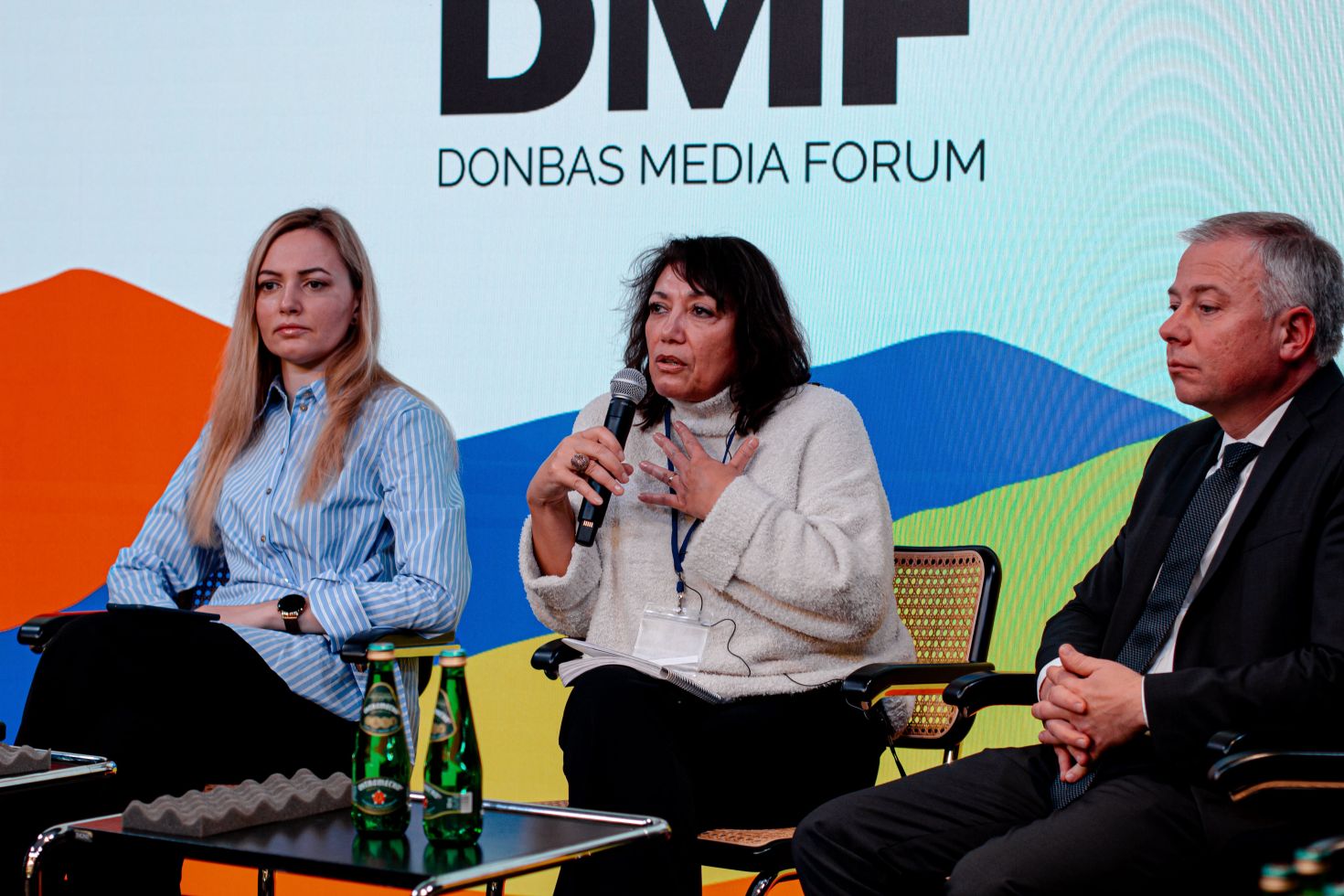
A second event in Warsaw
The second part of the forum occurred on 27-28 November 2023 in Warsaw. Organised and supported by Free Press Unlimited in collaboration with our partner media, Donbass News team, this segment primarily catered to foreign journalists and representatives of international organisations unable to travel to Kyiv. However, it was equally crucial for Ukrainian journalists to connect with counterparts who had relocated to Europe, affording them a few safe days away from the sound of bombing alarms.
Notably, many participants came from smaller towns, often in precarious situations. For instance, a representative from the Bilopolshina newspaper, currently run by a team of 5 individuals in a building severely damaged by bombings, attended the event. The newspaper operates a mere 7 kilometers from the Russian border. Bilopolshina has been publishing news for 103 years now. It only had to cease activities twice: between 1941 – 1943, and from 24 February 2022 to 22 April 2022, while the city was temporarily occupied by Russians.
"When you don't print newspapers, your enemy will print them instead of you," an interview on DMF - Global by Bilopolshina, 9 December 2023
Many local media in Ukraine from the territories close to the frontline are incapable of operating and publishing due to a lack of human and financial resources. Bilopolshina also has changed a lot since the beginning of the full-scale invasion. It is not colorful anymore, but black and white, its circulation is 2000 instead of 7000, and they do not publish analytics and entertainment. They are writing about local developments for the local audience like the number of people who are killed or have disappeared in the Sumy region, updates for conscripts, and just plain reports of the current facts. When the post is not working or delivery is impossible, Bilopolshina delivers the newspaper to small villages in the neighborhood by bike.
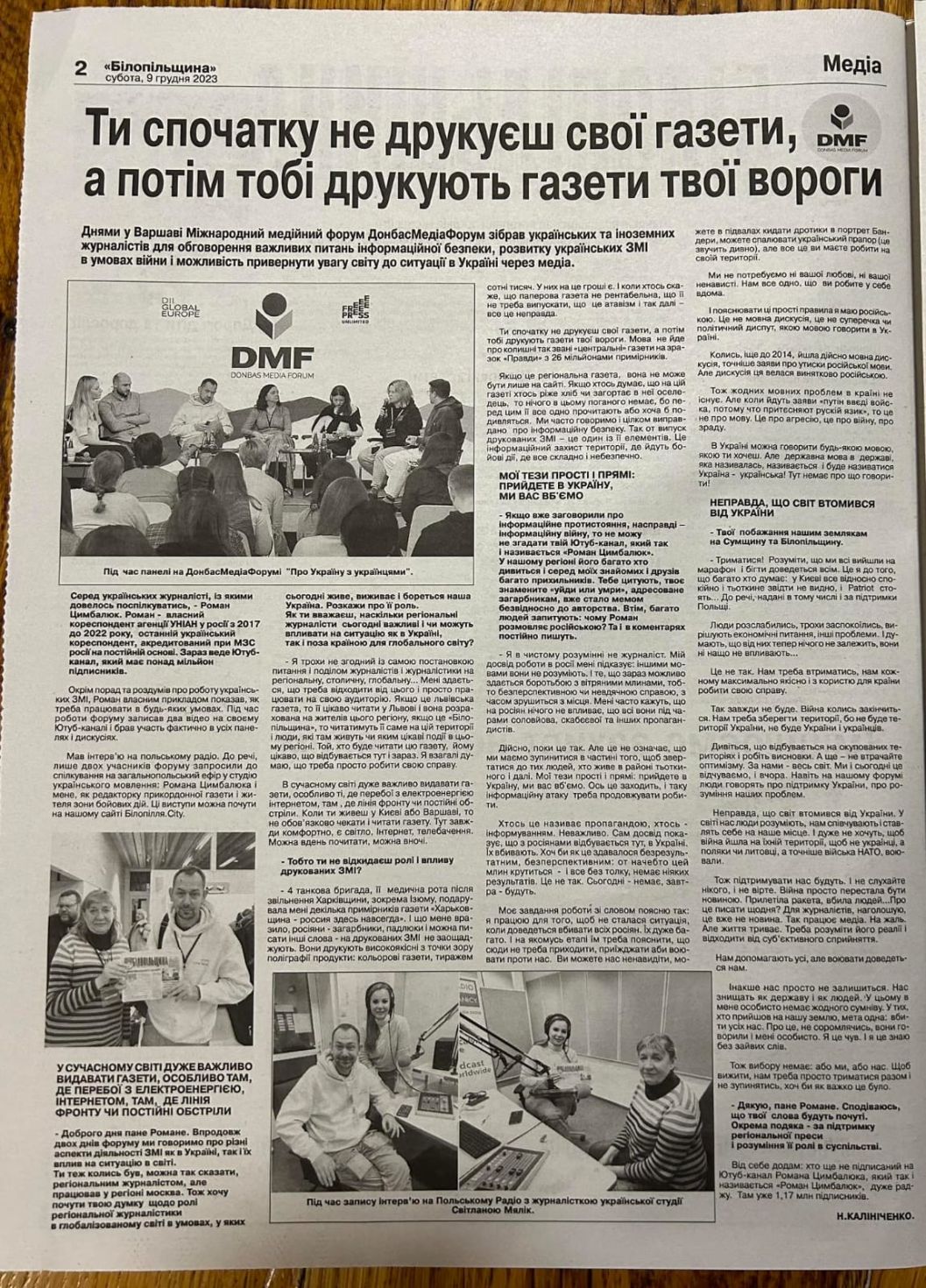
Remembering killed journalists
During the forum, a moment of silence was observed for the journalists who lost their lives in Ukraine. So far, according to the Institute of Mass Information of Ukraine, 70 journalists have been killed since February 24, 2022. 10 died while reporting, and 60 died as combatants or were killed by Russian shelling or torture. Additionally, concerns were raised about the lack of tracking for newsrooms damaged or destroyed due to the ongoing war.
Discussions and knowledge exchange
The Warsaw event, held in the Ukrainian and English language with simultaneous translation available, comprised six panel sessions with 86 participants, addressing pivotal issues such as the journalists' role in collecting evidence of war crimes. Panelists shared experiences, emphasising the distinction between conventional journalism and gathering evidence for military crimes. Some highlighted the use of modern technologies, including chatbots enabling anonymous reporting by the local population.
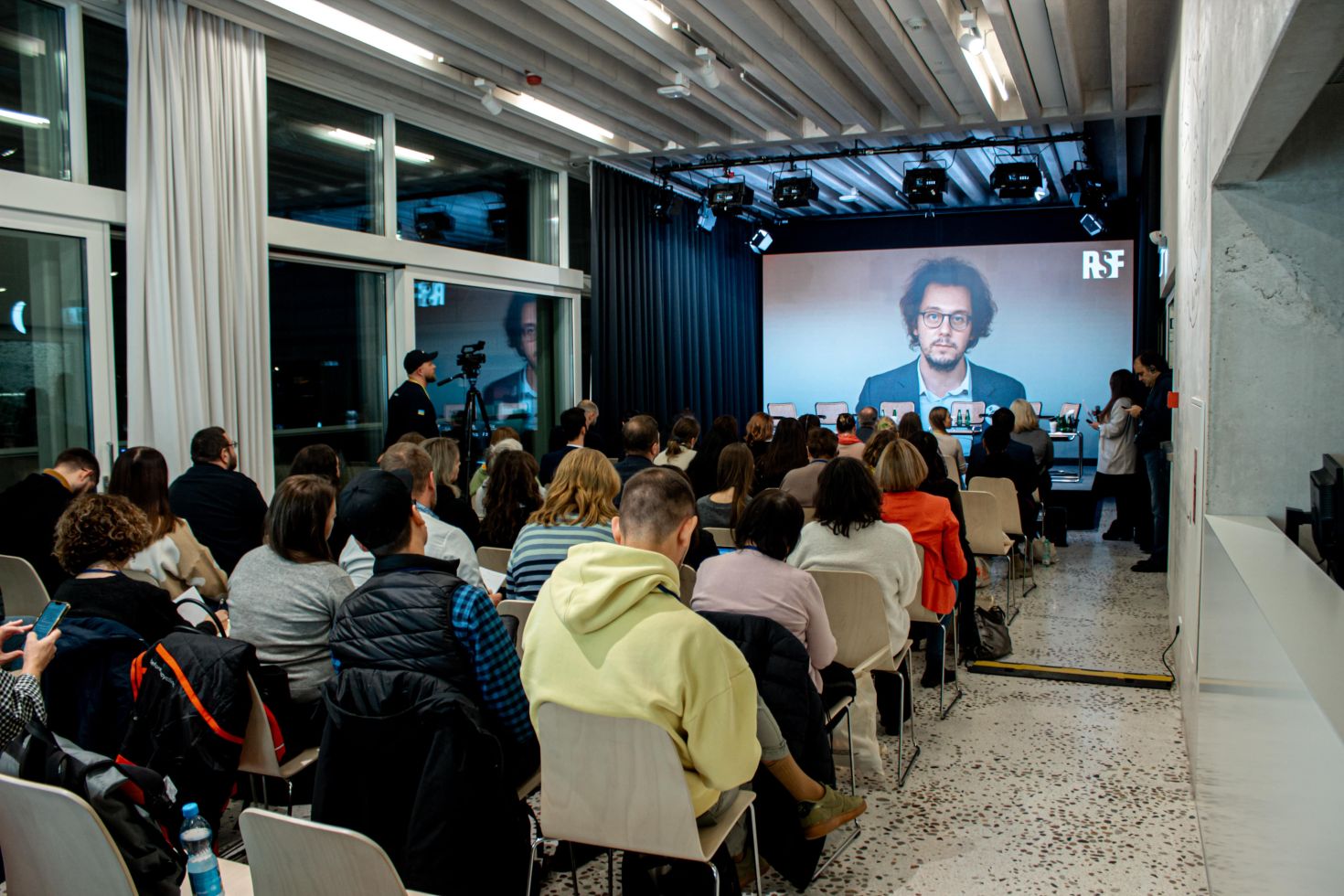
Participants underlined the significance of local and hyper-local media outlets in war coverage, citing instances where these outlets provided crucial information swiftly, such as during the destruction of the Kakhovka power station.
Discussion on resilience against Russian propaganda involved participants from Estonia, Lithuania, and Poland sharing their experiences. A Ukrainian participant highlighted fact-checking initiatives, while a representative from Lithuania pointed out the growth of fact-checking units and investigative journalism teams in their country since 2014, emphasizing positive aspects amid the challenges posed by propaganda.
12,000 brave journalists
In the face of relentless danger and targeted attacks by Russian forces, the bravery of Ukrainian and foreign journalists covering the war in Ukraine cannot be overstated. With over 12,000 journalists accredited to report on the conflict, their vital role in documenting the truth cannot be ignored. While the risks are particularly acute for journalists in temporarily occupied areas, the entire Ukrainian media landscape has been profoundly affected by the ongoing conflict.
The importance of sustained support for the Ukrainian media sector, which has been under strain since the conflict began in 2014, cannot be understated. This support must encompass recognition of the invaluable contributions of journalists at the grassroot level, who often operate in rural and temporarily occupied territories, providing crucial insights and perspectives to those left without electricity and, thus, access to news via the Internet and television.
Shifting attention
As international attention shifts to other global crises, Ukrainians feel a pressing need for solidarity and support from the broader community. Advocacy for Ukrainian voices and acknowledgment of the essential role played by local journalists are crucial in maintaining morale and ensuring the continuation of objective reporting on the war.
In this challenging environment, messages of solidarity and support to the wider journalist community in Ukraine are not only appreciated but essential. By amplifying these voices and demonstrating unwavering support, allies can provide much-needed encouragement to those risking their lives to shine a light on the truth amidst the turmoil of war.
Needed support
As Russia's invasion of Ukraine has reached its two-year mark, journalists operating in this volatile environment face persistent threats to their physical and psychosocial well-being, navigating heightened risks near the front-lines.
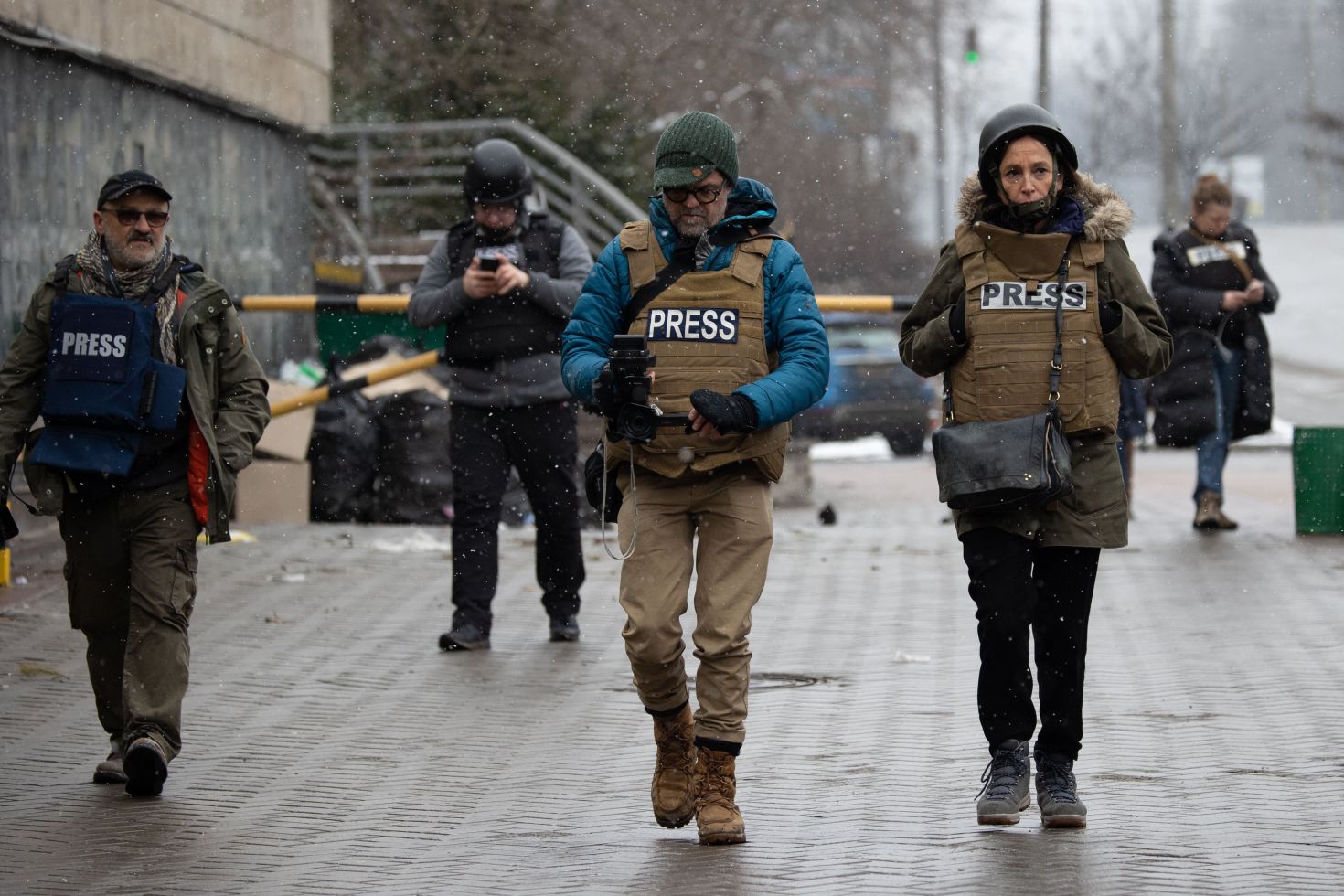
In response to these challenges, the West should prioritise providing financial aid and capacity-building programs to support Ukrainian media outlets and journalists. Strengthening legal protections is essential to safeguard journalists and combat impunity for attacks on the press. Additionally, fostering international partnerships and investing in technology can enhance the resilience and reach of Ukrainian media in the digital age. Finally, public awareness campaigns and diplomatic advocacy efforts are crucial for promoting press freedom and media pluralism in Ukraine.
The Donbas Media Forum stands as a testament to the resilience and dedication of journalists amidst the ongoing war in Ukraine. The event highlighted the need for such safe places to foster collaboration between Ukrainian grassroots journalists and big international media outlets, sharing experiences, and fortifying the resolve of journalists dedicated to truth amidst adversity.
